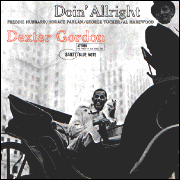A musician of Dexter Gordon's reputation (particularly in the special setting of this recording), playing at the top of his game, will always inspire the men around him to do their best. Here, young Freddie Hubbard, impressive as he has been on Blue Note in the past, adds new, thoughtful qualities to his brassy fire. That this was no ordinary date is evident in every microgroove.
The rhythm section plays for Dexter, seeming to sense what he wants, following his lead yet never lagging. These three are no strangers to Blue Noters. As the Horace Parlan trio or as 3/5 of the Horace Parlan quintet (with the Turrentine brothers as the horns), they have made several swinging LPs. Presently, they are appearing around New York with tenorman Booker Ervin under the title, The Playhouse Four.
George Gershwin's "I Was Doing All Right," the opener and title tune, is stated in a full-toned manner by Gordon at a loping medium tempo. He eases into his unhurried solo with a couple of bows to his old buddy Wardell Gray. Logic, warmth and melody abound. Hubbard plays beautifully and pensively, putting one in mind of Clifford Brown and some of Miles Davis' early '50s thinking. Parlan picks up the mood and spins out his solo in an equally relaxed, thoughtful way, ending with some perfumed chords.
The way he handles a ballad is one good indicator of a musician's depth. Dexter's "You've Changed" is a gorgeous piece of meaningful horn-singing by a man who knows what it's all about. Some of the lower register tones remind me of Don Byas, another old Gordon colleague (52nd Street vintage) who influenced quite a few people himself. The upper register and the story told are unmistakably Gordon. Hubbard is inspired again to play a poignant albiet short bit. Parlan's even shorter interlude leads back to Gordon's tender conclusion. Billie Holliday couldn't have done it any better herself.
"For Regulars Only" is a Gordon original with a catchy, contrasting theme. Dexter masterfully demonstrates how to build a solo, climbing up the thermometer, chorus after chorus, until his last one satisfies completely. Hubbard cooks in a brief solo; Parlan alternates his stint between single-line and chords.
A marching, skipping, funky blues is Gordon's "Society Red." It settles into a steady 4/4 as Hubbard takes an opening solo that beats things up with leaping rhythmic figures and a brightly burning flame of a sound. Again, Gordon builds to a point of climax. Here he does it more slowly than in "For Regulars Only," spreading his expansive tone over a longer period of time. Parlan's single-line leads into a blue chordal exploration before George Tucker plucks his only lengthy solo of the set.
"It's You Or No One" finds Dexter ascending to the upper reaches of his horn, alternating swift flights with rhythmic punching. Freddie is fleet but with underlying substance. After Horace's solo, Tucker walks and Harewood talks as they weave in and out of the ensemble.
Dexter Gordon is a big man physically and musically. This album is representative of that kind of size.
--IRA GITLER, from the liner notes.
Supported by Freddie Hubbard and the Horace Parlan trio, Dexter Gordon began his association with Blue Note with this session, which quickly rekindled his career and ended an eight-year lull. As well as two magnificent readings of standards, it introduced two of his finest and most lasting compositions "For Regulars Only" and "Society Red," which found new life in the film Round Midnight. Dexter would recut and release "I Want More" on his next Blue Note album Dexter Calling.
--MICHAEL CUSCUNA, from the liner notes.




